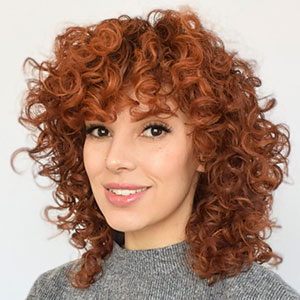
Get the latest Academy content and special deals direct to your inbox
A male or female bowl cut is a unisex and versatile short hairstyle. A bowl haircut can be made to be a more modern bowl or a vintage classic mod bowl. The variety in styles that bowl cuts come in make it a fun hairstyle to work with. The bowl cut hairstyle can be made dramatically different based on the type of tool used, the techniques used and of course the desired outcome.
When you use a scissor vs. a razor to cut a bowl hair cut, you can see how the differences are uncanny. This pixie bowl hairstyle compares the use of these 2 different tools and shows you how they give different effects and final outcomes. To do this, Russell Mayes, Director of Content for Jatai, does one half of the pixie bowl style haircut with a Jatai Tokyo Scissor and the other with a Feather Plier Razor.
Follow along in this video tutorial and transcript.
Welcome back to Jatai Academy! Today we’re going to be doing a comparison between a razor and a straight scissor when doing a pixie bowl haircut. So let’s get started.

Then we’re going to take a parallel section to that and I’m going to continue to walk my guide all the way to the back of the head. There’s my guide underneath, work that through.
Next section I’m working that back pulling it to the previously cut section straight out from the head. There’s my angle. I’m going to follow that through.
And I am using my Jatai Tokyo Scissor. It’s a five and a half inch which I think is perfect for when you’re trying to deal with short little pieces of hair and it will force you to deal with smaller sections so you can work cleaner.
Pull that through. There’s my guide. Continuing to work that through and down into the nape. And I’m just going to keep doing this until I get all the way to the center or the back of the head.
After I’ve gone through and cut this whole side I want to go back in and cross check it. Now to cross check, since I cut everything on the angle vertical I’m going to go through horizontally and just make sure everything blends.
I’m not trying to re-cut it. I’m just trying to make sure that there’s no long pieces or any kind of major dips from me going through and cutting that vertically and walking my guide back.

I’m going to pull this out from the head, longer at the top shorter underneath and I’m going to try to make sure I get it the same length. So I’m going to take kind of a tight razor stroke, but then I’m going to go through and put some internal texture to it.
So it’s going to give me a solid shape with separation as opposed to taking a really broad stroke and feathering the whole thing out. Start with my length in the front, work that back. After I do that section, I’m going to go through and channel each section as I go back to kind of make that separate into pieces.
Follow us on your favorite social media @jataifeather
Nice tight stroke after I cut my length. I’m going to go through and put some internal texture to force that to separate into pieces and work that back. Now to try to match the sides when I’m using two different techniques it’s going to be difficult so I’m not really too worried about it.
I’m just going to go through it, cut this side as if I was to cut it with a razor. I’ll cut the other side as if I was to cut it with a scissor because that’s what I’m doing and then we’ll just compare the results.
This is not trying to make both sides look the same. Pull out forward, there’s my length in the front. Work that down and through. Put me some internal texture into it.
Take this next section all the way down to the nape. Pin that hair out of the way. Take my previously cut section as a guide. Work that down and through and then a little bit of texture in each section.
Now my last section as I start to cross over the other side should be very little hair here to reach and I’m just going to make sure all of that blends through. A little bit of texture.

Cut this up and out and through. Check my length. I want to make sure that this shape kind of bevels but I still build up some volume through there so by continuing the graduated line up and then just rounding it out I’ll build up some fullness in the back.
I’ll pivot using the center and the underneath length as my guide. Continue that up and out. I’m going to follow the same line up and out. Now this bevels the shape in the back and I have a nice smooth kind of shape.
Now we’re going to start to pivot and work that into the front. There’s the length from underneath as my guide. Pivot again. Hold this out. There is my length…oh watch out.
Now here once I hit the mastoid, I will start to disconnect the underneath and build up a little bit of length towards the front so this is more of just a guesstimate at where I want that length to go because I know on their front I’m getting this kind of length. So I want to keep that somewhere around the eyeball.
There’s my guide underneath. Now you see our little fringe dropping out there so let’s go ahead and start to bevel that shape a little bit through there. And that’s not looking too bad, not looking too shabby.

I have a little bit of my guide from my scissor side to give me kind of the pathway to cut on the razor side. After I go and cut each section I will then go through and put a little bit of a deep channel into each section that I’m going through and cutting.
Remove the previously cut hair. Move into my next section. Comb that up and out. Now let’s go through put a little bit of texture in there. Here we go. Continue this until I run out of hair and clean up my line here a wee bit.
Well, we can certainly see a difference between the two sides even though they were cut in the same pattern and following the same guides. So let’s blow it dry take a look at it and analyze our end result.
Here’s our finished look. It looks very mod to me kind of a mod 60s kind of thing, that kind of pixie bowl cut from the 60s. So right side all done with the scissors, blunt cut, no texturizing to it at all. And you can really see the shape is very solid. It builds out a lot of weight and solidity around the sides as it’s working towards the front.
And then if we look at the razor side I went through and tried to do it exactly the same. You can certainly see there’s a lot more softness to it, a lot less weight and a lot more texture to it.
Oh come here. How can you handle all that hair in your eyes? Well, that’s amazing. Anyway, uh things to remember. The stronger deeper the stroke the more weight you’re going to remove and the shorter it’s going to feel.
When you’re working blunt with the straight scissor with the Tokyo scissor you got to be really diligent to maintain exactly on top of your guide so you don’t create any kind of lumpiness and waviness especially when you’re transitioning from back into the front and building up this graduation that we put in horizontally.
Let me know which side you like better. You like the 60s blunt mob or you like the texture all kinds of wildness over here which is more a little punk rock. Let me know which one you like better.
Leave a comment below and check out the JATAI Academy. There’s all kinds of great information on there that make you a better hairdresser and make you a better barber. Let us know what you’d like to see in the future, and we will catch you next time. Thank you so much!
Bowl cut hairstyles can cut with different tools to create different effects which will influence the final outcome. Additionally, there can be other nuances to the cut that can make it look very different from other versions. The beauty of this cut is that it’s a low maintenance, versatile style that can work as a unisex short style.

JATAI provides innovative and professional quality beauty implements with world-class customer service and educational support. To offer great products as a master distributor, we seek out and select only manufacturers who demonstrate superior workmanship, the most advanced technology, and respected business core values of reliability, honesty and integrity. Accordingly, JATAI represents three major ‘workhorse’ brands that dominate within their categories. Feather, Seki Edge and Fuji Paper. JATAI Academy brings beauty tools to creative life. It’s the ultimate professional information resource where Education, Artistry and Trends CONNECT for Stylists and Barbers.









